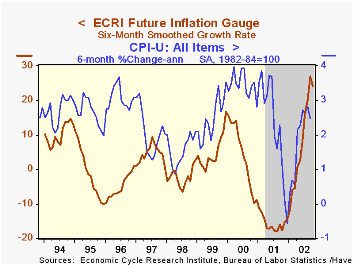 Global| Nov 18 2002
Global| Nov 18 2002Manpower Survey Hiring Index Improved for 1Q03
by:Tom Moeller
|in:Economy in Brief
Summary
The Manpower Employment Outlook Survey index of net hiring rose for 1Q03 from the improved level of the prior six months. The not seasonally adjusted survey results indicated that 20% of firms plan to add employees in 1Q03 compared to [...]

The Manpower Employment Outlook Survey index of net hiring rose for 1Q03 from the improved level of the prior six months.
The not seasonally adjusted survey results indicated that 20% of firms plan to add employees in 1Q03 compared to 24% in 4Q. 12% planned to cut payrolls in 1Q compared to 9% in 4Q.
Hiring typically weakens seasonally in 1Q and layoffs also typically rise
Over the last 25 years there has been an 77% correlation between the Manpower survey net hiring figure and the y/y change in nonfarm payrolls. That correlation fell to 51% during the most recent ten years.
Manpower surveys nearly 16,000 public & private firms in 477 US markets.
| Manpower Employment Outlook Survey | 1Q03 | 4Q02 | 1Q02 | 2002 | 2001 | 2000 |
|---|---|---|---|---|---|---|
| All Industries: Net Higher (SA, %) | 16 | 14 | 8 | 11 | 17 | 24 |
by Tom Moeller November 18, 2002

The Future Inflation Gauge (FIG) published by the Economic Cycle Research Institute (ECRI) remained stable in October after sharp m/m gains in six of the prior seven months. Gains in those months were also revised higher.
The indicator's six-month growth rate of 24.1% was the strongest growth rate in the record of the index which dates back to 1994.
The monthly FIG has a mean lead of 11 months and a median lead of 9 months at inflation cycle turns .
The eight components of the FIG are commodity prices, employment measures, capacity measures, import prices, the yield spread, real estate and debt.
For more on ECRI visit businesscycle.com.
| ECRI | Oct | Sept | Y/Y | 2001 | 2000 | 1999 |
|---|---|---|---|---|---|---|
| Future Inflation Gauge | 114.6 | 114.6 | 17.8% | -14.2% | 6.5% | 3.5% |
Tom Moeller
AuthorMore in Author Profile »Prior to joining Haver Analytics in 2000, Mr. Moeller worked as the Economist at Chancellor Capital Management from 1985 to 1999. There, he developed comprehensive economic forecasts and interpreted economic data for equity and fixed income portfolio managers. Also at Chancellor, Mr. Moeller worked as an equity analyst and was responsible for researching and rating companies in the economically sensitive automobile and housing industries for investment in Chancellor’s equity portfolio. Prior to joining Chancellor, Mr. Moeller was an Economist at Citibank from 1979 to 1984. He also analyzed pricing behavior in the metals industry for the Council on Wage and Price Stability in Washington, D.C. In 1999, Mr. Moeller received the award for most accurate forecast from the Forecasters' Club of New York. From 1990 to 1992 he was President of the New York Association for Business Economists. Mr. Moeller earned an M.B.A. in Finance from Fordham University, where he graduated in 1987. He holds a Bachelor of Arts in Economics from George Washington University.
More Economy in Brief
 Global| Feb 05 2026
Global| Feb 05 2026Charts of the Week: Balanced Policy, Resilient Data and AI Narratives
by:Andrew Cates






